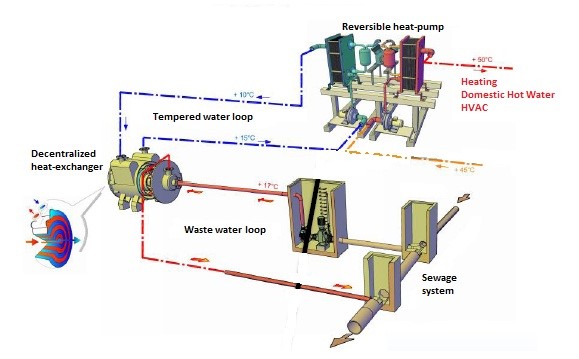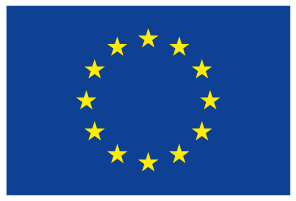France
2019
- Type : Project
- Size : Local community
- Area : Residential
Environmental benefit
Reuse of waste heat from a sewage system in Nice
Share
France
2019
- Type : Project
- Size : Local community
- Area : Residential
Environmental benefit
Discover this use case online

Based on this political commitment for sustainability, the project “Grand Arenas” was conceptualised in 2011. The international business quarter situated near the international airport of Nice Côte d’Azur will increase fivefold to 49 hectare and revolve around two key hubs: a congress centre and a multifunctional meeting space. The whole quarter is based on an urban planning concept of mixed-use that integrates businesses, shops, hotels and diverse residential buildings, including social housing, to ensure a social mix.
A vital part of the sustainability aspect of “Grand Arenas” project is an innovative waste heat recovery process to serve a neighbourhood through a low temperature district heating network with waste heat from the sewage system. In a first phase, operational by the end of 2018, a block of 20,000 m2 of office and hotel space will be powered by the north-south sewage collector.
Wastewater leaving homes and offices, especially hot wastewater, is an energy source that can be used for heating buildings. Sewage heat recovery systems are therefore an ideal low-carbon source for cities to supply a district heating network. The Nice “Grand Arenas” district heating network will include a substation equipped with heat pumps for supplying both heating and cooling to buildings. Since the buildings present mixed-use, a heat pump will guarantee the balance of heating and cooling supply and return from one building to another. Additional cooling storage is required to achieve an optimal balance for heating and cooling in the system. Photovoltaic thermal hybrid solar collectors, producing both thermal and electric power, will also be part of the concept to reach a high renewable and waste heat energy share.
More info
 R-ACES has received funding from the European Union’s Horizon 2020 research and innovation programme under grant agreement N° 892429
R-ACES has received funding from the European Union’s Horizon 2020 research and innovation programme under grant agreement N° 892429
Based on this political commitment for sustainability, the project “Grand Arenas” was conceptualised in 2011. The international business quarter situated near the international airport of Nice Côte d’Azur will increase fivefold to 49 hectare and revolve around two key hubs: a congress centre and a multifunctional meeting space. The whole quarter is based on an urban planning concept of mixed-use that integrates businesses, shops, hotels and diverse residential buildings, including social housing, to ensure a social mix.
A vital part of the sustainability aspect of “Grand Arenas” project is an innovative waste heat recovery process to serve a neighbourhood through a low temperature district heating network with waste heat from the sewage system. In a first phase, operational by the end of 2018, a block of 20,000 m2 of office and hotel space will be powered by the north-south sewage collector.
Wastewater leaving homes and offices, especially hot wastewater, is an energy source that can be used for heating buildings. Sewage heat recovery systems are therefore an ideal low-carbon source for cities to supply a district heating network. The Nice “Grand Arenas” district heating network will include a substation equipped with heat pumps for supplying both heating and cooling to buildings. Since the buildings present mixed-use, a heat pump will guarantee the balance of heating and cooling supply and return from one building to another. Additional cooling storage is required to achieve an optimal balance for heating and cooling in the system. Photovoltaic thermal hybrid solar collectors, producing both thermal and electric power, will also be part of the concept to reach a high renewable and waste heat energy share.
